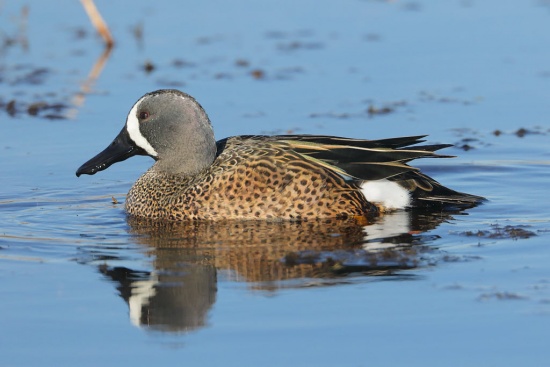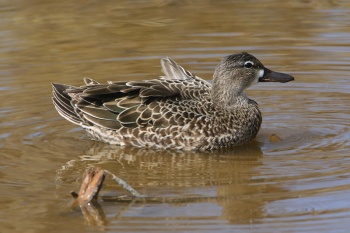(Picture placement due to edit button issues) |
(→External Links: Combined English and scientific names.) |
||
| (7 intermediate revisions by 4 users not shown) | |||
| Line 1: | Line 1: | ||
| − | [[Image:Blue-winged Teal drake, Florida.jpg|thumb|550px|right|Male in breeding plumage<br />Photo by {{user|bobsofpa|bobsofpa}}<br />Paynes Prairie State Park, [[Florida]], [[USA]] | + | [[Image:Blue-winged Teal drake, Florida.jpg|thumb|550px|right|Male in breeding plumage<br />Photo by {{user|bobsofpa|bobsofpa}}<br />Paynes Prairie State Park, [[Florida]], [[USA]], February 2015]] |
| − | ;[[:Category: | + | ;[[:Category:Spatula|Spatula]] discors |
==Identification== | ==Identification== | ||
| − | [[Image:608-03640fg2 Female Blue-winged Teal.jpg|thumb|350px|right|Female<br />Photo by {{user|bobsofpa|bobsofpa}}<br />Eco Pond, [[Everglades National Park]], [[Florida]], [[USA]], April 2008]] | + | [[Image:608-03640fg2 Female Blue-winged Teal.jpg|thumb|350px|right|Female<br />Photo © by {{user|bobsofpa|bobsofpa}}<br />Eco Pond, [[Everglades National Park]], [[Florida]], [[USA]], April 2008]] |
Length 35–41 cm (14-16"), wingspan 63–69 cm, weight 270–410 g | Length 35–41 cm (14-16"), wingspan 63–69 cm, weight 270–410 g | ||
*Small brown duck | *Small brown duck | ||
| Line 16: | Line 16: | ||
*Similar to female | *Similar to female | ||
==Distribution== | ==Distribution== | ||
| − | [[Image:8623-19-05-081rsaushslbs100clpen.jpg|thumb|300px|right|Photo by {{user|richard+bledsoe|richard bledsoe}}<br />[[Merritt Island National Wildlife Refuge]], Titusville, [[Florida]], March 2005]] | + | [[Image:8623-19-05-081rsaushslbs100clpen.jpg|thumb|300px|right|Photo © by {{user|richard+bledsoe|richard bledsoe}}<br />[[Merritt Island National Wildlife Refuge]], Titusville, [[Florida]], March 2005]] |
Mainly [[North America]]. | Mainly [[North America]]. | ||
| Line 26: | Line 26: | ||
==Taxonomy== | ==Taxonomy== | ||
| + | [[Image:Blue-winged Teal.jpg|thumb|350px|right|Male molting out of eclipse, showing blue forewing while preening<br />Photo © by {{user|David+Roach|David Roach}}<br />Wakodahatchee, [[Florida]], October 2005]] | ||
Most closely related to [[Cinnamon Teal]] (with [[Dictionary_G-L#H|hybrids]] recorded frequently); also less closely to [[Garganey]], [[Northern Shoveler]], and the other shovelers. | Most closely related to [[Cinnamon Teal]] (with [[Dictionary_G-L#H|hybrids]] recorded frequently); also less closely to [[Garganey]], [[Northern Shoveler]], and the other shovelers. | ||
This is a [[Dictionary_M-O#M|monotypic]] species<sup>[[#References|[1]]]</sup>. | This is a [[Dictionary_M-O#M|monotypic]] species<sup>[[#References|[1]]]</sup>. | ||
| − | Subspecies '' | + | Subspecies ''S. d. orphna'' is generally considered invalid<sup>[[#References|[2]]]</sup>.<br /> |
| − | + | Formerly placed in the genus ''[[:Category:Anas|Anas]]''. | |
==Habitat== | ==Habitat== | ||
Marshes, shallow ponds, and lakes. | Marshes, shallow ponds, and lakes. | ||
==Behaviour== | ==Behaviour== | ||
| − | |||
These birds fly in small groups or flocks. | These birds fly in small groups or flocks. | ||
===Breeding=== | ===Breeding=== | ||
| Line 43: | Line 43: | ||
==References== | ==References== | ||
| − | #{{Ref- | + | #{{Ref-Clements6thAug18}}#Avibase |
| − | |||
#Collins Bird Guide ISBN 0 00 219728 | #Collins Bird Guide ISBN 0 00 219728 | ||
{{ref}} | {{ref}} | ||
| + | |||
==External Links== | ==External Links== | ||
| − | {{GSearch|Anas | + | {{GSearch|"Blue-winged Teal" {{!}} "Spatula discors {{!}} "Anas discors" }} |
| − | + | {{GS-checked}}1 | |
| − | {{ | ||
| − | [[Category:Birds]][[Category: | + | [[Category:Birds]][[Category:Spatula]] |
Latest revision as of 13:57, 11 June 2023
- Spatula discors
Identification
Length 35–41 cm (14-16"), wingspan 63–69 cm, weight 270–410 g
- Small brown duck
- Pale blue forewing patches, obvious in flight, and when preening, but hidden at rest.
Male
- Blue-gray head with white crescent in front of eye
- Orangey-brown flanks with black spots
- Black tail coverts and white thigh patch
Female
- Mottled brown; intermediate between females of Cinnamon Teal and Garganey, with stronger patterning on face and pale spot at base of bill than former, but less marked than latter
- Grayer and larger billed than female Green-winged Teal, with pale blue shoulder patches like male, and lacks pale streak under tail sides.
Juvenile and eclipse male
- Similar to female
Distribution
Mainly North America.
Breeds from southeastern Alaska and western Canada east to southern Newfoundland and south to northeastern California, Texas, and Maryland.
Winters from southern California, southern Texas, and North Carolina southward through Central America to northern South America.
Vagrants are record in the British Isles annually (though some may have escaped from wildfowl collections); also recorded from most other western European countries, Morocco, and Hawaii and the Galapagos Islands.
Taxonomy

Photo © by David Roach
Wakodahatchee, Florida, October 2005
Most closely related to Cinnamon Teal (with hybrids recorded frequently); also less closely to Garganey, Northern Shoveler, and the other shovelers.
This is a monotypic species[1].
Subspecies S. d. orphna is generally considered invalid[2].
Formerly placed in the genus Anas.
Habitat
Marshes, shallow ponds, and lakes.
Behaviour
These birds fly in small groups or flocks.
Breeding
The female incubates the 9-12 dull white eggs in a down-lined hollow concealed in grass near water. The male guards.
Vocalisation
Soft lisping or peeping note. Female utters a soft quack.
References
- Clements, J. F., T. S. Schulenberg, M. J. Iliff, D. Roberson, T. A. Fredericks, B. L. Sullivan, and C. L. Wood. 2018. The eBird/Clements checklist of birds of the world: v2018. Downloaded from http://www.birds.cornell.edu/clementschecklist/download/
- Avibase
- Collins Bird Guide ISBN 0 00 219728
Recommended Citation
- BirdForum Opus contributors. (2024) Blue-winged Teal. In: BirdForum, the forum for wild birds and birding. Retrieved 17 May 2024 from https://www.birdforum.net/opus/Blue-winged_Teal
External Links
GSearch checked for 2020 platform.1






